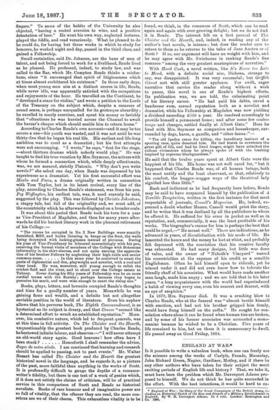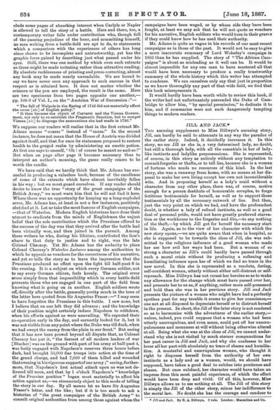ENGLAND AT WAR.* Is it possible to write a valueless
book, when one can freely use the scissors among the works of Carlyle, Fronde, Macaulay, John Richard Green, Napier, Gardiner, Motley, and if there be any other authors who have taken for their subject the most exciting periods of English life and history ? That, we take it, must have been the problem which Mr. Davenport Adams pro- posed to himself. We do not think he has quite succeeded in the effort. With the beat intentions, it would be hard to ex-
• England at War the Story of the Great Campaigns of the British Army, in- cluding an Historical Retch of the Rise and °south of a Military Estattiehmrae in England. By W. H. Davenport Adama, In 2 vole. London Remington and CO. 1283.
elude some pages of absorbing interest when Carlyle or Napier is allowed to tell the story of a battle. Here and there, too, a contemporary writer falls under contribution who, though full of the passing prejudices of the hour, and committing himself, as men writing from a battle-field are apt to do, to statements which a comparison with the experiences of others has long since shown to be incomplete and untrustworthy, yet has the graphic force gained by describing just what passed under his oyes. Still, there was one method by which even such extracts as these might be made irritating rather than attractive reading. By absolute recklessness of printing and press.correcting, almost any book may be made nearly unreadable. We are bound to say we have never seen any approach to such success in that respect as is attained here. It does not matter whether the scissors or the pen are employed, the result is the same. Here are two specimens from two pages opposite one another,— pp. 168-9 of Vol. L, on the "Austrian War of Succession
"The fall of Walpole in the Spring of 1742 did not materially affect the cause [sic] of English policy." "It then became the objeot of Carteret and the Vienna Govern- ment, not only to reestablish the Pragmatic Sanction, but to compel Vienna [sic] to disgorge the annexations she had made in 1736."
We suppose our readers will realise that in the first extract Mr. Adams means " course " instead of "cause." In the second instance, he does not mean that the House of Austria was divided against itself, and that for once its statesmen proposed to restore health to the gorged realm by administering an emetic potion. At first one says to oneself, ' Oh ! of course he meant so.and.so!" But when on page after page it becomes necessary thus to interpret an author's meaning, the game really ceases to be worth the candle.
We have said that we hardly think that Mr. Adams has suc- ceeded in producing a valueless book, because of the excellence of some of the extracts which have almost inevitably fallen in his way ; but we must guard ourselves. If any reader should desire to know the true "story of the great campaigns of the British Army," we must warn him that he will not find it here. Where there was an opportunity for keeping up a long-exploded error. Mr. Adams has, at least in not a few instances, positively clutched at it. Let us take the most famous of English campaigns, —that of Waterloo. Modern English historians have done their utmost to eradicate from the minds of Englishmen the unjust belief that the sole contribution which the Prussians offered to the success of the day was that they arrived after the battle had been virtually won, and then joined in the pursuit. Among these writers he who, during his lifetime, contributed the lion's share to that duty to justice and to right, was the late (blond Chesney. Yet Mr. Adams has the audacity to place Colonel Chesney's Waterloo Lectures among the authorities to which he appeals as vouchers for the correctness of his narrative, and yet so tells the story as to leave the impression that the Prussians produced no effect upon the fight till half-past 6 in the evening. It is a subject on which every German soldier, not to say every German citizen, feels keenly. The original error arose simply from that impossibility which in every battle-field prevents those who are engaged in one part of the field from knowing what is going on in another. English soldiers wrote od, directly after the battle, generally pretty much in the tone of the letter here quoted from Sir Augustus Fraser :—" I may seem to have forgotten the Prussians in this battle. I saw none, but I believe that on our left they did advance ; and the knowledge of their position might certainly induce Napoleon to withdraw, when his efforts against us were unavailing. We expected their co-operation early in the day, and earnestly looked for it, but it was not visible from any point where the Duke was till dusk, when we had swept the enemy from the plain in our front." But seeing that it has now been proved beyond all dispute that, as Colonel Chesney has put it, "the fiercest of all modern leaders of war 'Pincher] was on the ground with part of his army at half-past 4, was hotly engaged with Napoleon's reserves three hours before dark, had brought 50,000 fine troops into action at the time of the grand charge, and had 7,000 of them killed and wounded that evening in his vigorous support of our army ;" seeing, further- more, that Napoleon's first actual attack upon us was not de- livered till noon, and that by 1 o'clock Napoleon's "knowledge of the Prussian position" began most materially to affect his action against us,—we strenuously object to this mode of telling the story in our day. By all means let us have Sir Augustus Fraser's letter, and the like; but if it is too much to ask a historian of "the great campaigns of the British Army" to consult original authorities from among those against whom the campaigns have been waged, or by whose side they have been fought, at least we may ask that he will not quote as vouchers for his narrative, English soldiers who would tarn in their graves if they could know how he has used their authority.
Mr. Adams is quite as vague in his records of our most recent campaigns as in those of the past. It would not be easy to give a more inaccurate summary of Lord Wolseley's campaign in 1882 than he has supplied. The story of "The African Cam- paigns" is about as misleading as it well can be. It would be almost impossible for any one man to have mastered all that would have been necessary to produce a really trustworthy summary of the whole history which this writer has attempted to condense. We can ourselves only say that just in proportion as we know thoroughly any part of that wide field, we find that this book misrepresents it.
It would hardly have been worth while to review this book, if the writer had not unfortunately persuaded the Doke of Cam- bridge to allow him, "by special permission," to dedicate it to him, and if summaries were not such dangerously tempting things to modern readers.



































 Previous page
Previous page